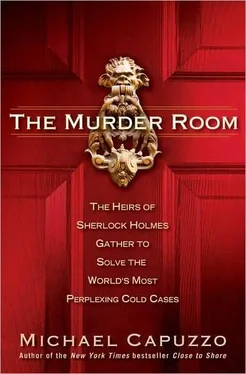Intrigued by crime and criminals, Richard went to study psychology at Michigan State University. A haughty, brilliant student, he set a school record by completing eleven courses in one semester, seven more than the usual load, with a near-perfect 3.8 grade point average because “one must have challenges.” He discovered his gift of seeing into the heart of darkness in his Shakespeare class, where he belittled the professor for suggesting that Hamlet fretted and delayed avenging his father’s murder because he was a conflicted, skeptical modern man. “As it happens, Hamlet is quite psychopathically brilliant, and plays the fool while passively controlling all the action in the play until his final revenge. I would have done it exactly the same way!”
In 1975, after a job as a clinical psychologist at the prestigious Cedars-Sinai Medical Center in Los Angeles fell through, he worked for a time at the Los Angeles County morgue under medical examiner Thomas Noguchi, who had handled the autopsies of Marilyn Monroe, Janis Joplin, John Belushi, Robert F. Kennedy, and Sharon Tate.
To be able to study hundreds of bodies, to immerse himself in the awful ways people die and are killed, he had to remain stoic, in total control of his emotions. One morning, he got a phone call with news-his father had died. He hung up and got dressed, put on his tie, and went to work. He went to a meeting on schedule. During a break from the meeting, out of the blue, a woman asked what his father did for a living. Walter said evenly, “Oh, he died.” She was taken back. “I’m so sorry. When?” He answered calmly, “This morning, about two hours ago.” They all finished the meeting. He went back to his desk in the lab. That night, he looked in the mirror and was shaken by the cold eyes staring back at him. He felt nothing. “That was pretty scary.”
He learned the lesson that his mentors in criminal investigation would later drill into his brain: “Whoever fights monsters should see to it that in the process he does not become a monster,” as Friedrich Nietzsche wrote. “And if you gaze long enough into an abyss, the abyss will gaze back into you.”
Walter began to obsessively collect antiques, grand, beautiful pieces from nineteenth-century France and China, “to remind myself there are beautiful things in the world.”
But he was hooked by the gory world of the morgue. He decided to spurn the more prestigious field of clinical psychology to become a prison psychologist. “There is high snobbery in the psychological world, and prisons are supposed to attract the dullest, the biggest drones, the most stupid,” he said. “That may or may not be true, but I’m going to do what I want, what is most fun for me, what satisfies my needs. Listening to neurotic housewives discuss their cats’ puberty won’t do it for me.”
In May 1978, he took a job in the frozen Upper Peninsula of Michigan as a psychologist at the old prison at Marquette, a Romanesque castle on Lake Superior with five-foot-thick stone walls. The castle housed all the most violent prisoners in Michigan in one place.
Winter had eight hours of daylight and fourteen feet of snow. For recreation, locals sat in a lakefront restaurant eating Cornish meat pies and watching the towering shards of lake ice break up as iron freighters came and went. Walter thought he had never seen such a gloomy, desolate place in his life.
The warden gave him his schedule. Each day he would see six appointments. Murderers, rapists, pedophiles, sadists, and serial killers. Men whose crimes had landed them in prison, and whose crimes in other prisons-stabbing a guard, gouging out a fellow inmate’s eye with a spoon, leading a riot-had landed them in the toughest prison of all.
They’d mostly be psychopaths, far more cunning than Wall Street lawyers. They would try to charm, beguile, or frighten him. They would try to convince him they’d found Jesus; threaten to strangle him, cut out his heart and piss on it, eat his kidneys. They’d tried to shock him: The man who’d stapled his children’s eyelids open, then urinated into them. The repeat child molesters who preyed on hundreds. Plato said that there were only a few ways to do good, but countless ways to do evil. He would hear all of them.
He would take it all in with a cold stare. His job was to judge whether a man was irredeemable, filled with demons that were a danger to him or to others, or whether a man’s better angels could be called forth. He had to judge them correctly every time; lives were at stake. It was a daily contest of wills.
Some would be bright and impressive with good families and high IQs; others were tattoo-inked creatures who gave people the shivers just to look at them.
He’d tell them, “Let’s be clear. The reason you are in prison is your neighbors don’t want you to break into their house and rape the cat.”
His office was a small rectangle with concrete-block walls, an old wooden desk and old steel filing cabinet, a wooden chair for clients. There was a single picture on the wall-a flower. A window that looked out on the iron-ore port, one of the coldest, snowiest, and darkest places in the United States.
“Perfect,” he said.
“What a terrible job,” a friend said. “Did you say you moved from Los Angeles?”
“It’ll be grand,” he said.
It was the ideal laboratory to study evil.
CHAPTER 8. GUARDIANS OF THE CITY
The community room at the First Federal Bank building at Castor and Cottman streets in northeast Philadelphia was crowded with Philadelphia and New Jersey cops, all Jewish cops.
Federal agent William Fleisher, one of the foremost Jewish cops in the Philadelphia region, stood to introduce the evening’s presenters on cold-case murder investigation. It was the monthly meeting of the Shomrim, Hebrew for “guardians,” the national association of Jewish police officers. Jewish cops had to stick together: “Kike” was still a sinister noun in police departments. As president of Shomrim’s Philadelphia chapter, Fleisher fought discrimination against men or women who were passed over for promotions in the tribal culture of police departments only because they belonged to the tribe of Abraham.
Fleisher was the assistant special agent in charge of U.S. Customs in Philadelphia, one of the most powerful federal agents in the Mid-Atlantic, responsible for criminal and drug law enforcement at the ports, airports, coastlines, and inland borders of three states. He commanded an $8 million budget, a hundred personnel, and sixty-five special agents in the Philadelphia field office, plus satellite offices in Pittsburgh, the Pennsylvania capital of Harrisburg, Wilmington, Delaware, and field agents in New Jersey. He had the equivalent federal rank of a full-bird colonel.
By that evening in 1984, Fleisher was a legend in the annals of federal officers. After two years in the Army-where hard-nosed first sergeant John Baylin “turned me into a man; it was the best mistake I ever made”-he’d returned home to Philadelphia and earned a sociology degree from Temple University, hoping to impress his father, a Temple alum. His father didn’t seem impressed. After college he fulfilled a dream and was hired as a Philadelphia police officer, one of his hometown’s “finest.” His father still didn’t seem impressed.
After three years as a patrolman and corporal, he joined the FBI as a special agent and made a name for himself as a fearless mob investigator in Boston, Detroit, Philadelphia, and New York. He became a renowned polygraph examiner and interrogator. Fleisher talked to everyone-pimps, hookers, politicians, door-men-and could wheedle information from anybody. He was a chameleon: friendly uncle, ruthless inquisitor, stout best friend, wise rabbi, comic. Once he went undercover on a Caribbean cruise as a stand-up comedian-and sent the crew to jail with smuggling convictions.
Читать дальше












